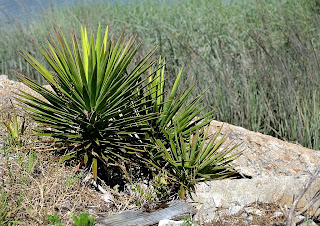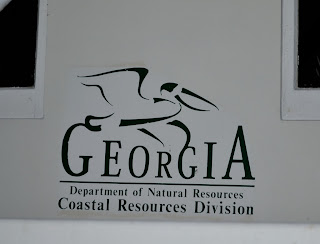I've been toting my camera with me all around the marina looking for that cute little mink that I met the other day when I didn't have my camera. As I was getting off the boat with the dogs, this Cheoy Lee was fueling up at the marina. I waited for him to leave so I could get a halfway decent pic of his boat, Black Swan.
Pretty, isn't it? And unusual. There's a small cockpit with windshield up on the bow which you can just barely make out in this photo.
Up in the yard with the dogs, I looked in vain for the mink. He must have seen me coming with the camera because he was nowhere to be found. Nonetheless, I like taking photos of, well, everything, so I did.
Sadly, no mink.
In transient news, the traffic is slowing down. Most folks are up in North Carolina by this time, but not everyone. John arrived in this brand new Seaward 26.
He's checking off a line item on his bucket list and singlehanding it from Florida, where he picked it up, to Maine. He'll then trailer it to his home base in California.
I stopped to chat with Ben who was servicing all of Whirlwind's winches. A couple of them are huge.
Ben seems to be very methodical. He has all his roller bearings lined up nicely.
Ruby wanted a snack while I was talking to Ben and pulled an oyster off a piling.
Later, R/V Anna pulled in.
Not "recreational vehicle". In marine lingo, it means "research vessel", and Anna is part of the Department of Natural Resources' fleet.
The dogs loved Anna.
A dog's sense of smell is 400 times better than a human's. I imagine there were all kinds of smells on Anna.
Shrimping has been banned since January in Georgia's waters because of a decline in the population of market sized food shrimp. Anna was sampling the four types of wild Georgia shrimp (white, brown, royal red, and pink) to determine the current population, and it looks like DNR may soon reopen the shrimp season. More sampling needs to be done though.
Wild Georgia shrimp are fished in their natural environment, not farms. According to the Montery Bay Aquarium, in southeast Asia "shrimp are cultivated intensively, pollutants and disease organisms build up in the muck beneath each pond. After a few years, the pond can no longer support healthy shrimp."
According to the National Marine Fisheries Service, thousands of U.S. shrimp industry jobs have been lost to shrimp imports and thousands more are threatened. From now on, when in a restaurant I'm going to ask if they offer wild Georgia shrimp or shrimp from a yucky Asian pond.
Pretty, isn't it? And unusual. There's a small cockpit with windshield up on the bow which you can just barely make out in this photo.
Up in the yard with the dogs, I looked in vain for the mink. He must have seen me coming with the camera because he was nowhere to be found. Nonetheless, I like taking photos of, well, everything, so I did.
Lance-leaved Coreopsis
Indian Blanket
Spanish Moss
Saw Palmetto
Pineapple Palm Tree
Sadly, no mink.
In transient news, the traffic is slowing down. Most folks are up in North Carolina by this time, but not everyone. John arrived in this brand new Seaward 26.
He's checking off a line item on his bucket list and singlehanding it from Florida, where he picked it up, to Maine. He'll then trailer it to his home base in California.
I stopped to chat with Ben who was servicing all of Whirlwind's winches. A couple of them are huge.
Ben seems to be very methodical. He has all his roller bearings lined up nicely.
Ruby wanted a snack while I was talking to Ben and pulled an oyster off a piling.
Later, R/V Anna pulled in.
Not "recreational vehicle". In marine lingo, it means "research vessel", and Anna is part of the Department of Natural Resources' fleet.
The dogs loved Anna.
A dog's sense of smell is 400 times better than a human's. I imagine there were all kinds of smells on Anna.
Shrimping has been banned since January in Georgia's waters because of a decline in the population of market sized food shrimp. Anna was sampling the four types of wild Georgia shrimp (white, brown, royal red, and pink) to determine the current population, and it looks like DNR may soon reopen the shrimp season. More sampling needs to be done though.
Wild Georgia shrimp are fished in their natural environment, not farms. According to the Montery Bay Aquarium, in southeast Asia "shrimp are cultivated intensively, pollutants and disease organisms build up in the muck beneath each pond. After a few years, the pond can no longer support healthy shrimp."
According to the National Marine Fisheries Service, thousands of U.S. shrimp industry jobs have been lost to shrimp imports and thousands more are threatened. From now on, when in a restaurant I'm going to ask if they offer wild Georgia shrimp or shrimp from a yucky Asian pond.

















No comments:
Post a Comment